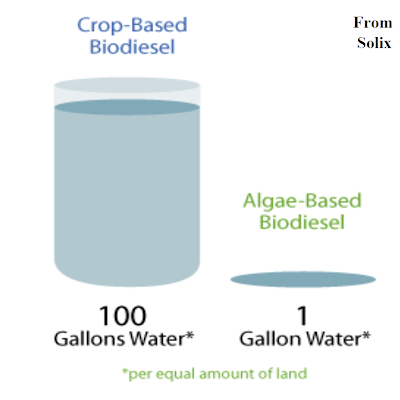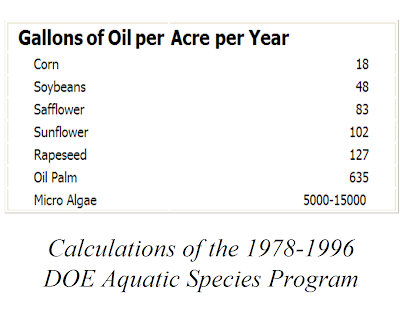EXXON BUYS ALGAE
Exxon Sinks $600M Into Algae-Based Biofuels in Major Strategy Shift
Katie Howell (w/Ben Geman), July 14, 2009 (NY Times)
and
Algae’s Big Break: Exxon, Craig Venter Launch $600M+ Algae Fuel Effort
Josie Garthwaite, July 14, 2009 (Earth2Tech via Reuters)
SUMMARY
Exxon Mobil Corp. has invested $600 million in Synthetic Genomics Inc.(SGI), for the research and development of next-generation algae-based biofuels.
Algae grow in any salt, swamp or waste water, in the presence of sunlight, and consume carbon dioxide (CO2) emissions for fuel. They can be refined into any of the liquid fuels or industrial feed stocks that can be refined from petroleum products.
The Exxon investment in SGI will initiate a 5-to-6 year collaboration by creating a new algae-based biofuels greenhouse test facility in San Diego to study growing and refining methods. Further investment will be required, on the order of billions of dollars, to scale the algae-growing and refining process up and bring products to market in commercial quantities through Exxon’s infrastructure.
 click to enlarge
click to enlargeIn the San Diego research and development program, SGI will focus on microengineering the algae and Exxon will do the macroengineering preparatory to commercialization.
Exxon Mobil is the biggest privately held oil company in the world. It has consistently opposed New Energy development until turning to this project. It now claims to have been investigating biofuels from many years.
 click to enlarge
click to enlargeEnvironmentalists’ reactions to the Exxon Mobil move into biofuels was mixed. While some hailed it as a validation, others were suspicious of greenwashing. They also pointed out that Exxon Mobil’s timing is suspiciously auspicious, positioning them for new large-scale financial subsidies likely to come with passage of an energy and climate bill.
The Renewable Fuels Standard (RFS) in the 2007 energy bill required annual biofuels production of 36 billion gallons by 2022. But Congressional leaders have since become aware of ways the RFS works against emerging technologies, including algae-based biofuels, and are likely to adjust it to create more incentive money for the better next-generation options.
 click to enlarge
click to enlargeSynthetic Genomics, Inc. (SGI), was created by Craig Venter, founder of the Human Genomics Project and credited with an instrumental role in the first complete mapping of the human genome. Venter’s pioneering work in genomics is much more to the Exxon Mobil undertaking in algae-based biofuels than a distinction on a resume. The single biggest task remaining in the use of algae for biofuels is identifying or creating the best kind of algae, the kind that manufacture the most lipids that are the least costly to extract. Venter's insight into algae genomes may be the shortest route to identifying and growing those algae, even as other researchers slave away at engineering-level improvements in the mechanics of the process.
 click to enlarge
click to enlargeVenter was quoted in 2008 as saying if oil companies did not want to invest in his algae biofuels, he would proceed without them. Venter called Exxon Mobil’s $600 million, including $300 million to buy him out, “the largest single investment in really trying to produce biofuels.”
What Exxon Mobil is paying for is the unique bioengineering that SGI has designed that has its strains of algae secreting the lipids that are the part of algae used to make petroleum substitutes. Extracting the lipids has been, until now, the most expensive part of the process.
 click to enlarge
click to enlargeCOMMENTARY
The companies have not indicated specifics of their project, whether the algae will be grown in open ponds or photobioreactors, how they will be refined or what products they intend to produce.
There is some degree of validity to environmentalists’ suspicions of Exxon Mobil’s move. Many recall that Chevron once bought and held the rights to battery technology that might have made the difference in the success of the first GM electric car in the 1990s.
Exxon's choice to move into algae-based biofuels does validate algae, one of the least-substantiated of the next-generation biofuels sources. Long-heralded as the most resource-efficient type of biofuels, algae are also possibly the least well understood of the major next-generation sources.
 click to enlarge
click to enlargeStudy of them goes back to the once well-known and but now long-forgotten Aquatic Species Program (ASP) run by the U.S. Department of Energy (DOE) from 1978 to 1996. First used to make methane by scientists at UC Berkeley in the mid-1950s, algae were revived as a domestic, renewable fuel source during the oil crises of the 1970s. ASP did the first thorough investigation of algaes' many possibilities, identified and quantified the unique potential of algae as a biofuel source but was abandoned when natural gas and oil prices plunged to all-time lows in the late 1990s.
 click to enlarge
click to enlargeThe ASP studied a wide variety of microalgae grown at locations around the U.S. under a wide variety of conditions. It offered a spectrum of important lessons including: (1) Many microalgae accumulate refineable lipids; (2) Diatoms and green algae seemed the most promising; (3) There appeared to be no perfect strain for every climate and water type; (4) Choosing the right starting species would be critical to large-scale production; (5) There was much to be learned about pathways, regulatory systems and genetics; (6) Dewatering of the algae and extraction of the lipids could be expected to be the most expensive part of the process; (7) Long-term, stable cultivation was achievable; (8) Temperature of the the growth process is critical; (9) Oxygen and water conditions matter; (10) Algae-based biofuels could not compete with petroleum in 1996 but could be expected to become cost-competitive; (11) There was ample land, water and CO2 available in the U.S. Southwest to grow 30+ billion gallons annually, though the economics of the time were challenging and R&D was needed.
Since the end of the ASP in 1996, (1) oil prices have risen to a level that is likely to make and keep algae-based biofuels competitive, (2) the increased concern with CO2 makes algae’s consumption of it more important, (3) the explosion in biotechnology has led to advances in metabolic engineering, genomics, proteomics, matabolomics, bioinformatics and, in short, the ability to make much better, much cheaper algae-based biofuels.
 click to enlarge
click to enlargeThe cost of lipid extraction has so far been so burdensome to the algae-biofuels production process that other would-be manufacturers have turned to selling byproducts like chemical feedstocks and fertilizer to up returns. Venter says SGI is working on pure hydrocarbon production. He calls the process “biomanufacturing” biofuels rather than farming algae.
The Exxon Mobil buy-in follows other financial backing for SGI from well-known venture capital firm Draper Fisher Jurvetson and oil giant BP.
 click to enlarge
click to enlargeQUOTES
- Emil Jacobs, vice president of research and development at Exxon Mobil Research and Engineering Co: "The world faces a significant challenge to supply the energy required for economic development and improved standards of living while managing greenhouse gas emissions and the risks of climate change…It's going to take integrated solutions and the development of all commercially viable energy sources, improved energy efficiency and effective steps to curb emissions. It is also going to include the development of new technology…It's fair to say that we looked at all the biofuels options…Algae ended up on top."
- Craig Venter, founder/CEO, SGI: "We're not claiming to know all the answers…There are different approaches to what is truly economically scalable, so we're testing things and giving a new reality to the timelines and expectations of what it takes to have a global impact on fuel supply."
- Jacobs, Exxon: "As far as products to expect from this program, our intent is to make hydrocarbons that look a lot like today's transportation fuels…We want to produce hydrocarbons that look like today's refinery products, that can go into a refinery to be processed along with other petroleum streams and then used in the transportation fleet or even jet fuel. And we think we've got a good chance of doing that."
 An algae-based biofuels factory and refinery. (click to enlarge)
An algae-based biofuels factory and refinery. (click to enlarge)- Riggs Eckelberry, president/CEO, OriginOil Inc.: "A couple years ago, the petroleum institute said there's only a couple of years left for oil, and now they're really finally acting on that…Algae is the feedstock to overtake petroleum. It's the real alternative to petroleum."
- Kert Davies, research director, Greenpeace: "They've never done anything like this before -- invested real money in the renewables sector…We've always said [the oil industry] has to be part of the climate change solution. We can't solve anything without companies like Exxon helping…[but] I'm guarding my optimism…It's interesting timing as the oil companies are struggling to find a place at the table…"
- Senator Jeff Bingaman (D-NM), Chair, Senate Energy & Natural Resources Committee: "Algae-based fuels are the most obvious example, which, despite having characteristics superior to any renewable fuels in commercial production today, have no home in the RFS…"
- From the 1996 ASP report: “…this report should be seen not as an ending, but as a beginning. When the time is right, we fully expect to see renewed interest in algae as a source of fuels and other chemicals. The highlights presented here should serve as a foundation for these future efforts.”








0 Comments:
Post a Comment
<< Home